Dura 'Likes': PNP social media rules and what police actually post
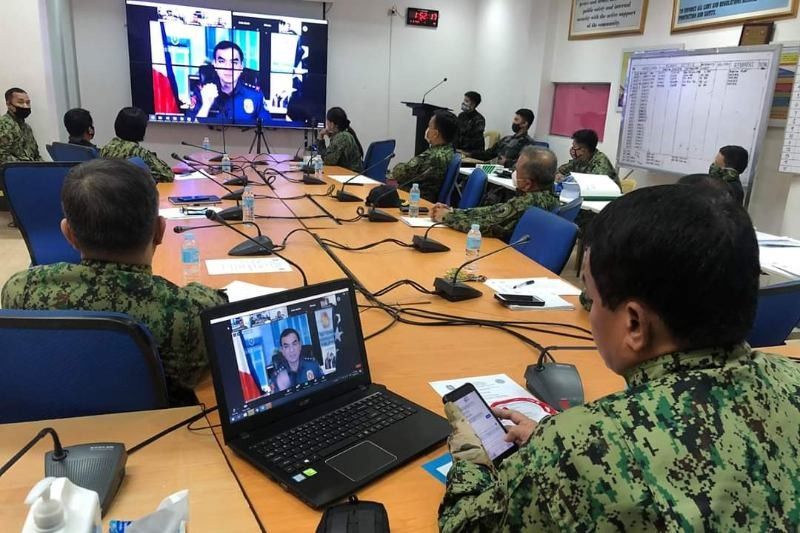
MANILA, Philippines — At a press briefing Monday, Police Gen. Archie Gamboa, who sits as chief of the Philippine National Police, warned that violations of the national police's social media protocols could warrant criminal and administrative raps for erring cops.
This was in response to a string of social media posts from the national police's own regional channels vilifying activists and left-leaning groups critical of the administration, accusing them of being fronts for communist rebels.
In a letter addressed to Facebook, Cordillera-based youth alliance Youth Act Now Against Tyranny (YANAT) Baguio-Benguet Chapter also said that they have been on the receiving end of what it called a smear campaign on social media by anonymous "trolls" and by the police for months.
“There is an enhanced protocol on social media which should be observed by the members of PNP. They can be charged administratively and if the evidence would warrant, even criminal cases,” Gamboa said at Monday's Laging Handa briefing.
READ: PNP 'art' tags activists as terrorists amid debate on anti-terrorism bill
In response to the posts by the PNP, Bagong Alyansang Makabayan (Bayan), whose secretary-general Renato Reyes was depicted with devil horns in an edited photo, said it would take legal action against those behind the page for what it called "crass and totally unprofessional" content on an official government channel.
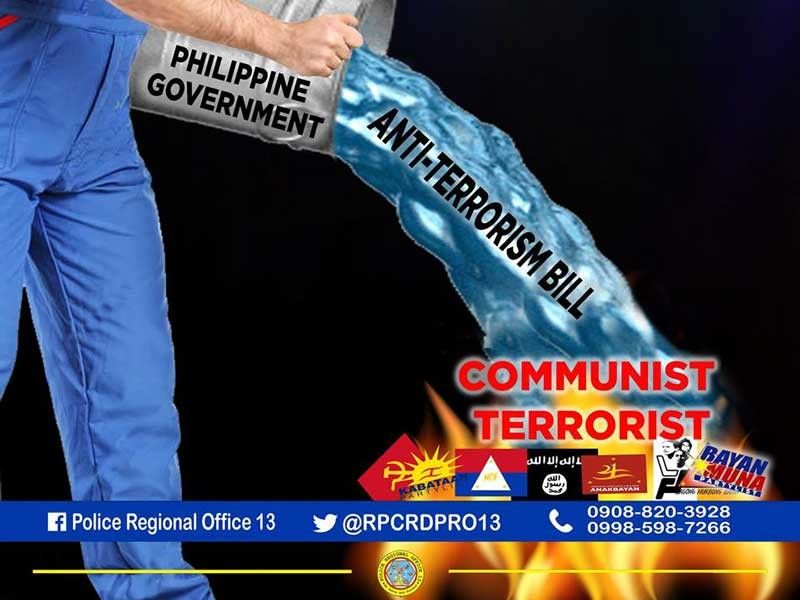
"This is obviously black propaganda. It is unethical for public officials to engage in such practices. This is the kind of climate where the anti-terror bill will be implemented. It is a climate of impunity and abuse of authority," Bayan's statement read.
The graphic "art" typically featuresactivists, along with accusations of their links to the Communist Party of the Philippines-New People's Army. Other posts even include the faces of those being red-tagged.
Some of the posts are still available on their respective pages as of this post.
"We will not take this sitting down. The PNP Region 13 will be held to account," they added.
What does the PNP’s social media guide say?
PNP Memorandum Circular 2020-034 released in March says that earlier PNP social media rules "introduced a more efficient and real-time approach with an empowered team which handles dissemination of narratives to influence and shape the minds of netizens."
"Generally, the laws and jurisprudence enjoined the state to respect the rights to association, self-organization, and freedom of expression of each and every individual," it reads.
The guidelines in the rule read:
- Ensure that all posts are not libelous, do not trigger cyber-bullying, and do not violate the Data Privacy Act and Intellectual Property Code of the Philippines.
- Ensure that all posts shall not disclose confidential information detrimental to the safety of any individual.
- Ensure that all posts shall not be inimical to the interest of the organization and to the (sic.) national security.
The copy, which is posted on the website of the University of the Philippines College of Law, cuts off there and seems to skip an entire page.
"Any PNP personnel who violates any of the General Guidelines of this MC shall be charged with Less Grave Neglect of Duty. However, if the act also constitutes a violation of law, he/she shall be charged for such act," the document later reads.
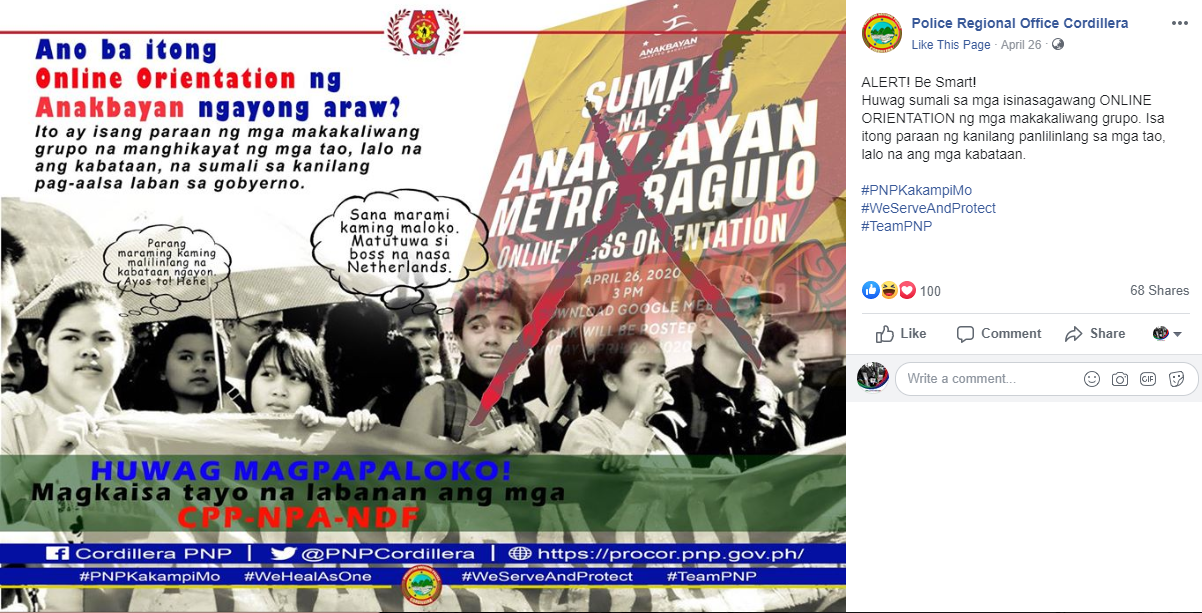
'Do not put PNP in a bad light'
The earlier PNP Memorandum Circular 2014-005 dated February 2014 also reads: "PNP personnel shall observe the basic principles in using social media, that is, being credible, consistent, responsive, and legal."
The PNP also has a rudimentary social media guide published on its official website urging personnel not to "use the PNP official social media site to endorse or promote products, political positions or religious ideologies that will place the PNP in bad light."
The same guide tells personnel to "always ensure that your official PNP office social media site is registered and listed in the PNP website Social Media Directory Page," though both the Police Regional Office 13 page and the Butuan Cps III page are nowhere to be found in the latter.
"Replace misinformation with fact, not an argument. When you see misinformation in social media about the PNP, you may utilize your official police office social media to correct the misinformation posted. When correcting do it in a respectful manner and coupled with solid factual information," the guide reads.
"When you converse with someone in social media, who wants to argue his or her position, be sure that yours is factual and respectful. Do not engage in an argument, just correct the misinformation made for the record. In case of doubt, you can always consult your immediate superior or Chief of Office," it adds.
READ: CHR urges PNP to enforce social media regulations amid 'baseless accusations' against activists
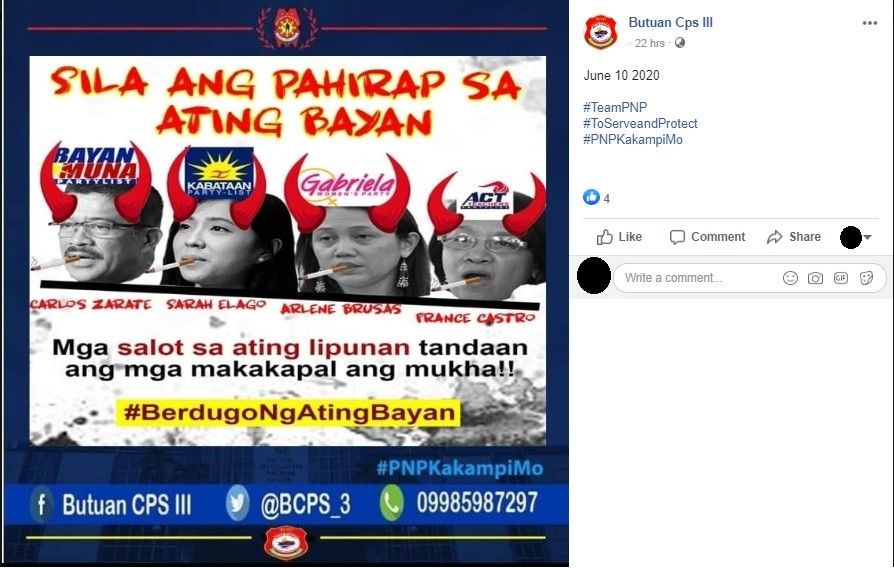
"Avoid hostile or derogatory post. Do not post information that is disrespectful, libelous, abusive, obscene, abusive, threatening, and other unethical or information that violate PNP Code of Conduct or policies of the PNP in official police office social media or personal account," it also says.
Section 6(l) of Memorandum Circular 2014-005 also mandates that: "PNP offices/units with existing Facebook Accounts shall convert the same to Facebook Page for purposes of conforming to the Facebook terms and uniformity among PNP offices/units."
"The PNP appears to have not fully utilized and taken advantage of the popularity of social networking sites...as a result, the public somehow remains discouraged and hesitant in openly communicating with police authorities and in reporting the existence of lawlessness in their localities," the same circular reads.
The last rule in the guide also reads: "Do not violate Philippine Data Privacy and Cybercrime Prevention laws. Do not post any information that would violate provisions of the Philippine Data Privacy and Cybercrime Prevention laws."
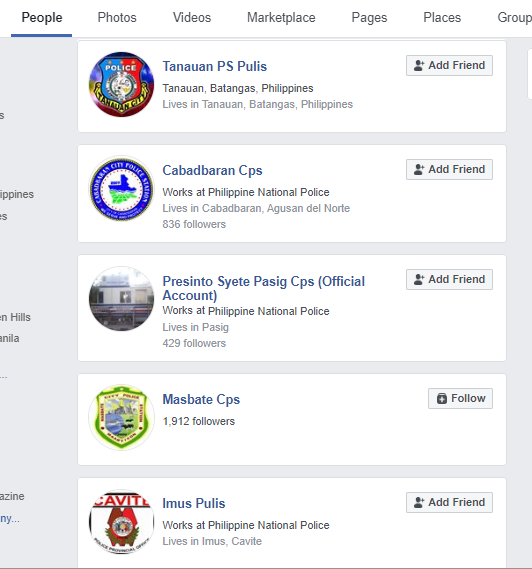
What the law says
Republic Act No. 10173 or the Data Privacy Act of 2012 defines personal information as any information whether recorded in a material form or not, from which the identity of an individual is apparent or can be reasonably and directly ascertained by the entity holding the information, or when put together with other information would directly and certainly identify an individual."
Sections 30 and 36 of the law read:
SEC. 30. Malicious Disclosure. – Any personal information controller or personal information processor or any of its officials, employees or agents, who, with malice or in bad faith, discloses unwarranted or false information relative to any personal information or personal sensitive information obtained by him or her, shall be subject to imprisonment ranging from one (1) year and six (6) months to five (5) years and a fine of not less than Five hundred thousand pesos (Php500,000.00) but not more than One million pesos (Php1,000,000.00).
SEC. 36. Offense Committed by Public Officer. – When the offender or the person responsible for the offense is a public officer as defined in the Administrative Code of the Philippines in the exercise of his or her duties, an accessory penalty consisting in the disqualification to occupy public office for a term double the term of criminal penalty imposed shall he applied.
Even the Bayanihan Heal as One Act, the law that handed President Rodrigo Duterte sweeping special powers, prohibits and penalizes spreading false information.
Section 6(f) of the law prohibits and penalizes the following:
- Individuals or groups creating, perpetrating, or spreading false information regarding the COVID-19 crisis on social media and other platforms, such information having no valid or beneficial effect on the population and are clearly geared to promote chaos, panic, anarchy, fear or confusion
- Those participating in cyber incidents that make use or take advantage of the current crisis situation to prey on public through scams, phishing, fraudulent emails or other similar acts
RELATED: During state of emergency, 'Bayanihan' Act allows imprisonment for 'false information'
"In the sea of disinformation online, social media content of government offices must only forward genuine public interest and must never be used to malign any individual or cause any harm to anyone with baseless accusations," the Commission on Human Rights said in its statement on Wednesday.
"We echo the call of the PNP chief and hope that such actions that might compromise the rights of a person would be avoided in the future with the agency’s commitment to strictly enforce its existing protocols," it added.
The case of Davao City Water District vs. Aranjuez G.R. No. 194192, which is cited in the PNP's most recent memorandum on social media usage, reads:
Freedom of expression is guaranteed in its fullest outside government but, perhaps, more regulated when one assumes the role of a public officer. The right to speech is inherent. However, the act of joining a government office should be construed as an understanding that the individual's exercise of this basic right is subsumed by the necessity of providing public sendees to the greater majority.
The limits are inherent in the nature of governance. The Constitution states that "[p]ublic officers and employees must at all times be accountable to the people, serve them with utmost responsibility, integrity, loyalty, and efficiency, act with patriotism and justice, and lead modest lives."
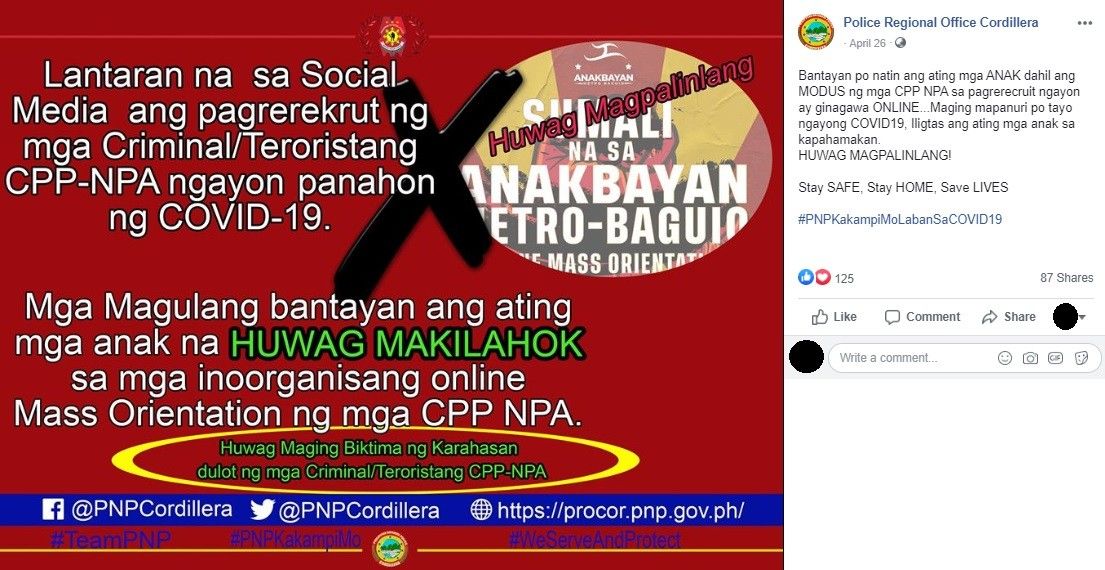
MC 2020-034 also invokes the Code of Conduct and Ethical Standards for Public Officials and Employees, under which government employees are made to observe the standards of commitment to democracy, public interest, political neutrality, professionalism, among others.
The PNP's Revised Community Relations Manual reads: "The thousands of acts each day that police officers perform are rarely recognized. Groups that profit from police controversies begin campaigns demonizing police. Their propaganda campaign is used to discredit the police and simple errors bring them to the front pages of newspapers."
"In the context of police operation and community relations, public information is used largely to educate the public and clarify issues that may provide vague meanings," it adds.
'Serious implications on security'
Days after Gamboa's warning, one post from a police-linked social media account was still published online, which Rep. Carlos Zarate (Bayan Muna Party-list) said was a sign that the police chief's warning had been largely ignored.
The CHR has warned that the practice of red-tagging, which has grown more common in recent weeks, "violates the constitutional guarantee of presumption of innocence and may have serious implications on the security and movement of individuals and groups involved."
This also comes as users on social media, most of them activists, began reporting an influx of blank, duplicate accounts bearing their names. Some users said they were messaged death threats by their "clones."
READ: Facebook duplicates 'may be used to perpetuate misinformation' — PNP
Despite its own content, even the national police has also acknowledged that the cloned accounts could be used to peddle misinformation.
“General Gamboa was already quoted warning police officers that they may be charged if they violate the organization’s social media protocols, but, it seems his warning only fell on deaf ears or deliberately ignored by his subordinates,” Zarate said.
Sa petsa ng May 1, 2020 ay ipinagdiriwang ang Araw ng mga Manggagawa, pero may mga makakaliwang grupo na laging kumokontra sa Gobiyerno at ang kanilang ipinaglalaban ay pansariling Interes lamang.
— PNPBaguioStn4 (@PNPBaguioStn4) April 30, 2020
#TeamPNP #PNPKakampiMo @PNPChiefGamboa @rwinp88 @arfc97 @PNPBaguio @rcaddprocor pic.twitter.com/GE0JmWbKwr
- Latest
- Trending



























